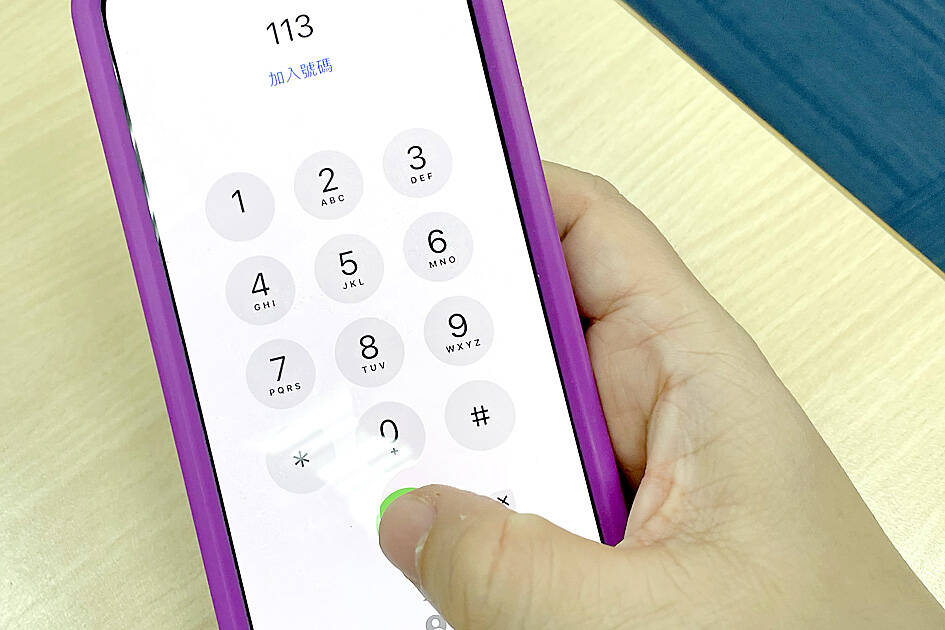Reports of abuse against elderly people over the past five years have grown by 52 percent, with the majority of incidents occurring over the Lunar New Year holiday, the Ministry of Health and Welfare said yesterday.
Department of Protective Services Director-General Chang Hsiu-yuan (張秀鴛) said that most incidents of elderly abuse are due to issues of care or reliance on the finances of elderly people.
Financial problems are especially prevalent over the Lunar New Year holiday, as people working part-time jobs or who are reliant on elderly people would need additional funds due to increased expenses during the holiday, Chang said.

Photo: Chiu Chih-jou, Taipei Times
As Taiwan is moving toward becoming a “hyper-aged” society, the government is seeing a rise in the number of reports of elderly people being abused, she added.
About 40 percent of calls to the 113 hotline were related to domestic abuse, she said.
The all-hours hotline is for people to report incidents or ask questions about domestic violence, sexual assault or harassment, as well as abuse or neglect of children, adolescents, elderly and disabled people.
Many elderly people are unwilling to ask for help, believing that telling others about abuse would bring shame upon their family, she said.
It is most often a neighbor, other family members or the police who report elderly abuse, Chang said.
The Lunar New Year period is when families get together, often after many months, and issues should be discussed with respect and understanding by all members, she said.
If there is a point of contention, people should walk away and cool down before discussing it further, she added.
The 113 hotline would be staffed around the clock throughout the Lunar New Year holiday, Chang said.
In addition to the telephone service, people can also text or use the hotline’s online services, she said.
Additional reporting by CNA

Taiwanese can file complaints with the Tourism Administration to report travel agencies if their activities caused termination of a person’s citizenship, Mainland Affairs Council Minister Chiu Chui-cheng (邱垂正) said yesterday, after a podcaster highlighted a case in which a person’s citizenship was canceled for receiving a single-use Chinese passport to enter Russia. The council is aware of incidents in which people who signed up through Chinese travel agencies for tours of Russia were told they could obtain Russian visas and fast-track border clearance, Chiu told reporters on the sidelines of an event in Taipei. However, the travel agencies actually applied

Japanese footwear brand Onitsuka Tiger today issued a public apology and said it has suspended an employee amid allegations that the staff member discriminated against a Vietnamese customer at its Taipei 101 store. Posting on the social media platform Threads yesterday, a user said that an employee at the store said that “those shoes are very expensive” when her friend, who is a migrant worker from Vietnam, asked for assistance. The employee then ignored her until she asked again, to which she replied: "We don't have a size 37." The post had amassed nearly 26,000 likes and 916 comments as of this

New measures aimed at making Taiwan more attractive to foreign professionals came into effect this month, the National Development Council said yesterday. Among the changes, international students at Taiwanese universities would be able to work in Taiwan without a work permit in the two years after they graduate, explainer materials provided by the council said. In addition, foreign nationals who graduated from one of the world’s top 200 universities within the past five years can also apply for a two-year open work permit. Previously, those graduates would have needed to apply for a work permit using point-based criteria or have a Taiwanese company

The Shilin District Prosecutors’ Office yesterday indicted two Taiwanese and issued a wanted notice for Pete Liu (劉作虎), founder of Shenzhen-based smartphone manufacturer OnePlus Technology Co (萬普拉斯科技), for allegedly contravening the Act Governing Relations Between the People of the Taiwan Area and the Mainland Area (臺灣地區與大陸地區人民關係條例) by poaching 70 engineers in Taiwan. Liu allegedly traveled to Taiwan at the end of 2014 and met with a Taiwanese man surnamed Lin (林) to discuss establishing a mobile software research and development (R&D) team in Taiwan, prosecutors said. Without approval from the government, Lin, following Liu’s instructions, recruited more than 70 software